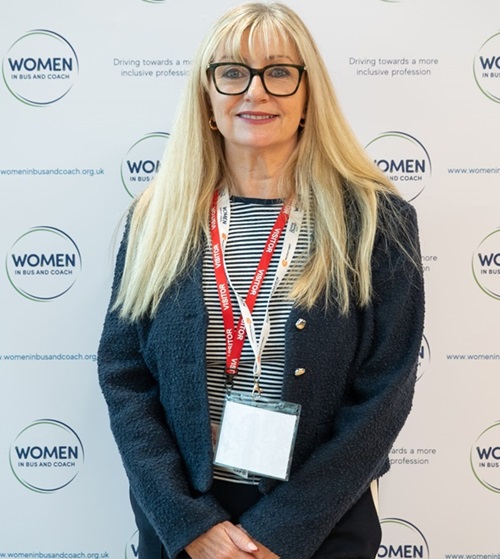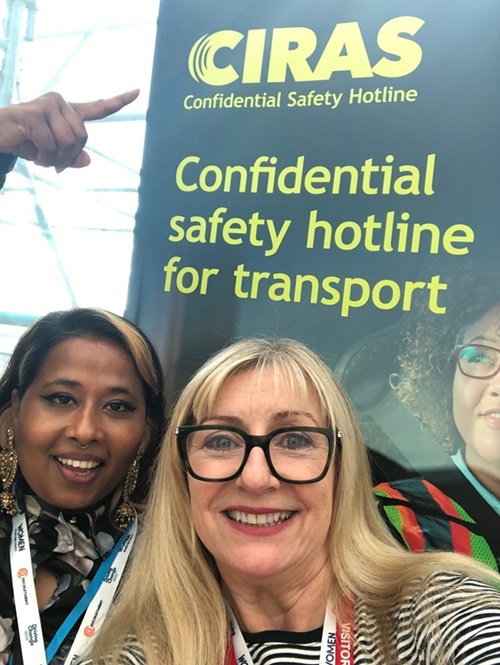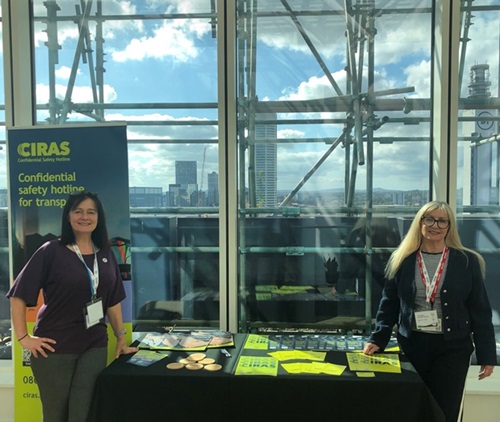Our stakeholder manager Amanda O’Donoghue (pictured) attended the Women in Bus and Coach annual summit and awards on 30 September. She shares her thoughts on how the day reflected the collaborative network’s aims, and CIRAS’ part in the conversation.

The Women in Bus and Coach second annual summit, held in Birmingham’s fabulous BT building, was a wonderful day of celebration. I was attending as a Women in Bus and Coach communications and marketing associate since its launch, and also representing CIRAS.
The event brought together leaders, frontline operators, allies, and supporters of the bus, coach and community travel sector to celebrate the successes of women working in the industry.
Women’s stories and successes
There was a fantastic line-up of inspirational keynote speakers, including Anne Shaw OBE, formerly executive director of Transport for West Midlands, and recently appointed as chief executive of the National Transport Authority in Ireland; Loveday Ryder, chief executive officer of the Driver and Vehicle Standards Agency; and Marie Daly, chief operating officer of Transport for Wales and chair of Women in Rail.
During the two panel sessions, we heard from the next generation—brimming with ideas and feedback on what needs to change within the industry—and from frontline voices, who shared experiences and challenges that resonated with many of us.
Key themes were flexible working, ill-fitting PPE, the lack of suitable welfare facilities, and provision of sanitary products. This has been a cause close to Women in Bus and Coach. It has been instrumental in championing and delivering its Period Positivity campaign, which calls for free period sanitary products being provided in the workplace. This has been a great success and is currently being adopted across the sector.
Throughout the day, powerful speakers told of the challenges they faced as women in the sector, juggling multiple responsibilities and priorities daily. They shared tips, advice, and information on how to navigate these journeys while remaining our authentic selves and not giving up.
I met with old faces and new from CIRAS members including Metroline, Stagecoach, First Bus, Go-Ahead, and Transport for London.
After lunch, it was time for the awards ceremony, to celebrate talent, determination, allyship, and excellence, with stories from amazing winners and nominees.

Above: Amanda with Women in Bus and Coach ally Koli Begum
Work culture challenges
We heard from Louise Cheeseman, chair of Women in Bus and Coach. Louise reminded us of how far Women in Bus and Coach had come and what it has achieved this past year. Unfortunately, we also heard from Louise about toxic workplace culture, detailing some of the inappropriate, offensive behaviours that women—who just want to do their job—are still experiencing today.
Going to work and facing a toxic work environment is real for many people working today. It’s sometimes hard to find your voice when you’re in these often confronting and difficult situations. Whether its snide comments, microaggressions, or inappropriate items in your locker—how do you call out this unwanted behaviour? Do you speak up and risk falling out with your peers? Do you say nothing and hope it goes away? How many times is too many times?
Toxic cultures impact health and wellbeing and put team safety at risk. This could be poor behaviours, poor safety culture that’s lax or not implemented, a poor drug and alcohol culture, or even a culture of safety silence, where no one speaks up or is fearful if they do.
How CIRAS can help
It got me thinking about the role that CIRAS can play in this space, and how we can help those who would otherwise stay silent to have a voice.
You can discuss your concerns with one of our reporting analysts and they will work with you to get your voice and concerns heard and sent to the right people to take action. They will remove any identifying information, allowing you to speak freely and ask questions through CIRAS.My colleague, Sue Gray, was also at the event. Sue adds: ‘Anyone can use CIRAS to report concerns about wider team or work culture that might impact on safety (although CIRAS can't take grievances or address an individual's actions, as this would breach our confidentiality code). CIRAS reports don’t identify the reporter, and don’t identify anyone else involved either. This means there’s no risk of grudges—or other negative consequences personally—from speaking up.
‘We listened to women while raising awareness of CIRAS on the day. Just being a woman in a mostly male working environment can be a barrier to speaking up. They said their actions, which could include raising a safety concern, can receive more commentary than men’s and are remembered for longer.
‘Some mentioned that when they do speak up, they aren’t listened to as closely as male colleagues, and it’s hard to be properly heard. One of the speakers mentioned her idea being ignored when she raised it twice. She gave her idea to a male colleague, and it was endorsed immediately when he raised it.
‘If someone’s not listened to, even their health and safety concerns can be missed. Confidential reporting helps by focusing on the concern and not on who’s raising it.’

Above: Sue and Amanda at the event
Final thoughts
The day concluded with regional updates, exciting announcements, and final speeches. I left feeling inspired and excited about what the next year will bring for Women in Bus and Coach.
